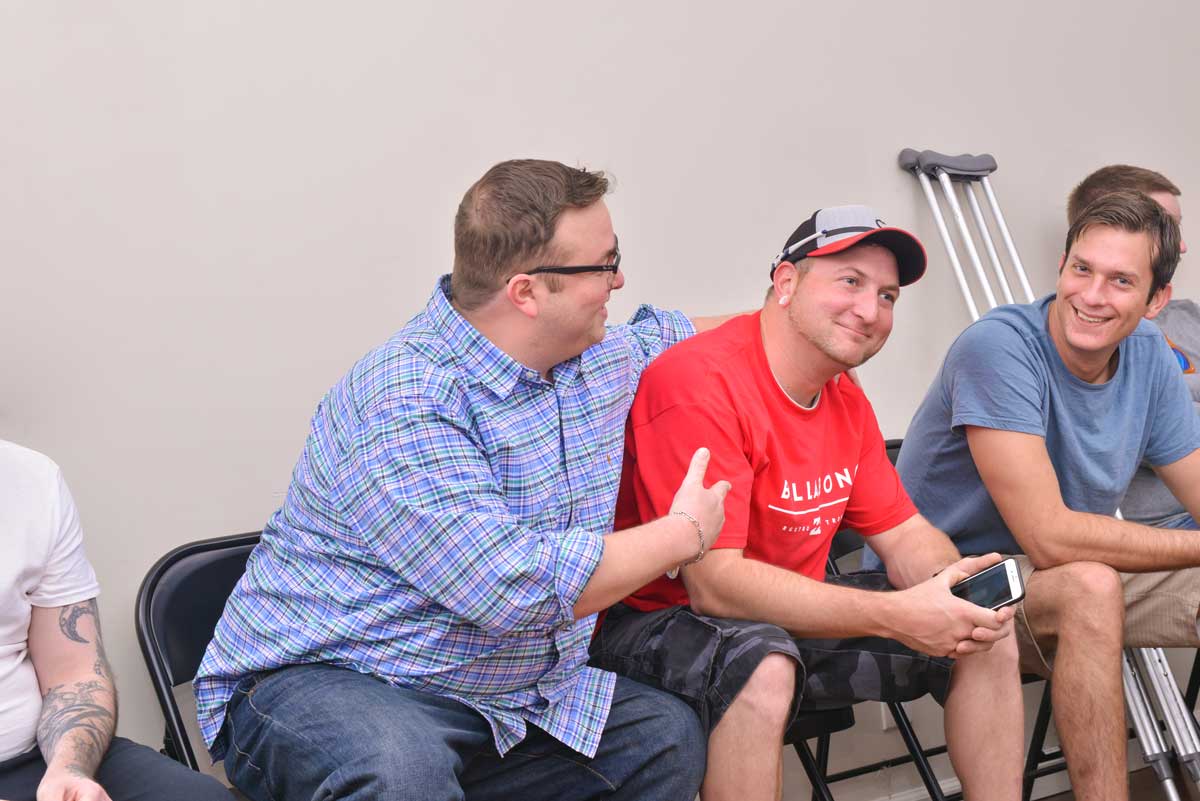Benzodiazepine Rehab
Understanding Benzo Addiction Treatment
The National Institute on Drug Abuse indicates that, between 1996 and 2013, benzo prescriptions increased from 8.1 million to 13.5 million. That same report states that, during 2015, twenty-three percent of individuals who overdosed on opioids also had benzodiazepines in their system.
The dangers of benzo and opioid addiction are rampant and well known in the opioid-using community. Loved ones, family members, and friends can be susceptible to addiction because of its relaxing and seemingly mild qualities of acting as a depressant on the brain’s central nervous system.
Educate yourself on what benzos are, the signs of addiction, what the benzo addiction treatment center can do for you, and how you can start to get sober today.
Benzodiazepine Addiction Treatment
If you or a loved one is prescribed benzodiazepines or are using them recreationally and believe that there is a problem, it is vital that you seek treatment.
Benzodiazepine addiction can be especially dangerous due to the way that benzodiazepine withdrawal affects the body, however, there are Orange County benzo detox programs available to help those who are struggling.
That said, benzo addiction doesn’t end with detox, for the best chance at defeating addiction, clients must seek out the help of an inpatient or intensive outpatient treatment program.
Renaissance Recovery is a state-of-the-art benzodiazepine rehab that can help you conquer addiction and stay on the straight and narrow. Let’s look a bit closer at benzodiazepine misuse and addiction.
How To Help a Loved One Struggling With Benzo Addiction?
If you suspect that a loved one is struggling with benzo addiction, it’s important to approach them with empathy and support. Encourage them to seek professional help and offer to help them research benzo addiction treatment options or accompany them to appointments. Remember to prioritize your own self-care and seek support from friends or family members during this challenging time.

Why Go to Benzo Rehab?
Despite the fact that benzodiazepines are a legal drug, they can still be misused and abused. And, for those who are going through this, it can easily cause addiction.
At Benzo treatment centers, individuals struggling with this addiction can get the help they need from experts and licensed professionals to not only get clean from benzos, but also obtain the tools and support they need to maintain long-term sobriety.
Once using regularly, benzo withdrawal and addiction can be a nightmare to deal with. But, with the help of a benzodiazepine treatment center, clients will learn more about their substance abuse and will develop the skills they need to conquer their addiction and remain sober through relapse prevention strategies.
Treatment for benzo addiction typically involves a combination of medication-assisted therapy and behavioral therapy, such as cognitive-behavioral therapy (CBT). Detoxification, a process of safely removing the drug from the body, is also an essential component of treatment.
Also, by going to benzo addiction treatment centers, clients will have access to our robust alumni and community programs to offer them the post-rehab support they need.
Can Benzo Addiction be Treated?
Yes, benzo addiction can be treated with a combination of medication-assisted therapy and behavioral therapy. Detoxification is also an important component of treatment to safely manage withdrawal symptoms.
Call Now
What to Expect at Benzo Rehab
Benzodiazepine addiction treatment can have a profound impact on an individual’s physical and mental health, and treatment often involves a comprehensive approach to address the complex nature of addiction. If you or a loved one is considering benzo rehab, it’s important to know what to expect during the treatment process.
Here are some common elements of benzo rehab:
Assessment and Evaluation
The first step in benzo rehab is an initial assessment and evaluation to determine the extent of addiction and any co-occurring mental health conditions. Healthcare professionals will conduct a comprehensive evaluation to determine the appropriate level of care and develop a personalized benzo addiction treatment plan.

Fight Back Against Benzodiazepines
Get evidence-based treatment to overcome benzo addiction at Renaissance Recovery. Call our team now to learn more about the process.

Medical Detoxification
Detoxification is an essential component of benzo rehab, as withdrawal from benzodiazepines can be potentially life-threatening. Medical detoxification involves a supervised, gradual tapering of the drug under medical supervision to manage withdrawal symptoms safely.
Medication-Assisted Treatment
MAT (medication-assisted treatment) may be recommended as part of a comprehensive benzo rehab program. MAT involves the use of medications to help manage cravings and withdrawal symptoms, such as anxiety and insomnia. Healthcare professionals will determine the appropriate medication and dosage based on individual needs.
Behavioral Therapy
Behavioral therapy is a crucial component of benzo rehab to address the psychological and behavioral aspects of addiction. CBT (cognitive-behavioral therapy) is a common form of therapy used in benzo rehab to help individuals identify negative thought patterns and develop healthier coping mechanisms. Other forms of therapy may include DBT (dialectical behavioral therapy), motivational interviewing, and group therapy.
Holistic Therapies
Holistic therapies, such as yoga, meditation, and acupuncture, may be incorporated into benzo rehab programs to help promote relaxation, reduce stress, and improve overall well-being.
Aftercare
Aftercare is an essential component of benzo rehab to help individuals maintain sobriety and prevent relapse. Aftercare planning may include ongoing therapy, participation in support groups, and access to community resources and services.
Family Therapy
Family therapy may be incorporated into benzo rehab programs to help individuals rebuild relationships with loved ones and address any family dynamics that may have contributed to addiction. This type of therapy can also help family members learn healthy communication and coping skills to support their loved one’s recovery.
Nutritional Support
Nutritional support is an important component of benzo rehab programs to help individuals improve their overall health and well-being. Nutrition education and support may be provided to help individuals develop healthy eating habits and address any nutritional deficiencies that may have resulted from addiction.
Benzo rehab is a comprehensive and individualized approach to treating benzodiazepine addiction. Treatment often involves medical detoxification, medication-assisted therapy, behavioral therapy, holistic therapies, aftercare planning, family therapy, and nutritional support. With the right support and treatment, recovery from benzo addiction is possible, and individuals can go on to live healthy, fulfilling lives in sobriety.
How to Find The Best Benzo Detox Centers
Finding the best benzo detox center for you or your loved one is an important part of the journey to sobriety.
The best place to start is by researching on Google, or talking to anyone you know who may have gone through rehab before to see what they recommend. Reaching out to addiction support groups like Alcoholics Anonymous can also be helpful, as it can introduce you to a large selection of people who are in recovery and understand what kind of program would work best.
Once you’ve narrowed down your options, it’s then important to make sure the benzo treatment centers you choose from have the proper accreditations and licenses, and have high ratings.
Another important aspect to consider is the location and housing, as well as comprehensive medical supervision.
Online reviews and testimonials can also provide a great insight into the quality of the benzo dependence treatment program you’re looking into.
If you’d like help with finding the program that works best for you or your loved one, call our addiction hotline at 866-693-3821 to get help from recovery experts who can guide you to the best benzo detox centers for you.

Can I Stop Taking Benzos On My Own?
It's not recommended to stop taking benzos on your own, as withdrawal symptoms can be severe and potentially life-threatening. It's important to seek professional help and medical supervision to safely manage withdrawal and ensure a successful recovery.
Call Now
Inpatient Treatment for Benzodiazepine Addiction
If you are searching for help for a benzodiazepine use disorder, it is normally best to start benzo dependence treatment at an inpatient medical detox program that can help you or your loved one overcome the early stages of sobriety and withdrawal.
From there, clients will receive various forms of behavioral and evidence-based treatment to help them learn more about their addiction and develop strategies to avoid relapse and future addiction problems.
Inpatient treatment is a helpful tool, especially for those new to the treatment process because it allows the addiction experts to help clients stay accountable to their sobriety. Moreover, it gives clients an opportunity to connect with other individuals who are in similar situations, learn from them, and begin building a sober support network they can lean on after their time in inpatient.
Outpatient Treatment for Benzodiazepine Addiction
Following a stay at an inpatient rehab, clients can stepdown into outpatient programs. Outpatient programs, like intensive outpatient or partial hospitalization programs, are in place to help clients continue their sobriety journey as they begin to adjust to life after rehab.
Whether you are seeking inpatient or outpatient benzodiazepine addiction treatment, the most important thing is that you are looking for help for your problem.
During your time in an outpatient program, clients will continue to go o group and individual therapy sessions as they work to better understand their addictions and fight back against the substance use disorders they are struggling with.
If you need assistance finding the right treatment program for you, check our Renaissance Recovery’s addiction and mental health services today.
Are you or someone you know experiencing benzo addiction or substance abuse? Do you or a family member have questions about a benzo addiction treatment center in Southern California? Navigating these challenges can be overwhelming, and no one has to go through that alone. The team at our benzo addiction treatment center is here to lend a helping hand and provide effective treatment that can help you overcome benzodiazepine abuse.
Contact Renaissance Recovery by calling our addiction treatment center today or completing our confidential online form to learn more about prescription drug abuse, benzo detox, and how rehab programs can help.
At Renaissance, we know that addiction can be caused by a number of reasons and we work to get to the root cause of the problem and help you overcome and underlying mental health issues that may be contributing to or causing the problem. Call our team to get the help you need and advice for attending treatment.

